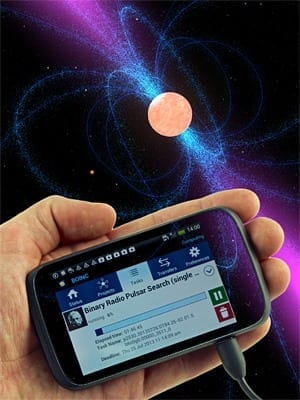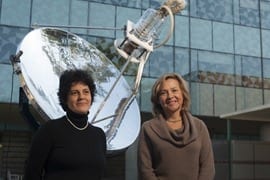
Android smartphone users will soon have a chance to participate in important scientific research every time they charge their phones.
Using a new app created by researchers at UC Berkeley, users will be able to donate a phone’s idle computing power to crunch numbers for projects that could lead to breakthroughs ranging from novel medical therapies to the discovery of new stars.
The app was created by a Berkeley project called BOINC (Berkeley Open Infrastructure for Network Computing), which is known for its computer software that supports more than 50 volunteer computing projects around the world. BOINC software allows projects to tap unused processing power donated by computer owners around the world to analyze data or run simulations that would normally require cost-prohibitive supercomputers.
The new Android app, also called BOINC, will be available Monday, July 22, from the Google Play Store and works on Android versions 2.3 or later. The app currently supports several popular computing projects, including Einstein@Home, which searches radio telescope data for spinning stars called pulsars, and FightAIDS@Home, which searches for more effective AIDS therapies as part of IBM’s World Community Grid. Android, owned by Google Inc., is the operating system used by two-thirds of all smartphones today.
“There are about a billion Android devices right now, and their total computing power exceeds that of the largest conventional supercomputers,” said BOINC creator David Anderson, a research scientist at UC Berkeley’s Space Sciences Laboratory. “Mobile devices are the wave of the future in many ways, including the raw computing power they can provide to solve computationally difficult problems.”
Creation of the app was funded by the Max Planck Institute, which runs Einstein@Home; Google Inc.; and the National Science Foundation, which has supported BOINC since 2002. IBM assisted in the design of the user interface and organized beta testing of the app.
“Our main goals are to make it easy for scientists to use BOINC to create volunteer computing projects to further their research, and to make it easier for volunteers to participate,” Anderson said.
The Latest Bing News on:
Idle smartphones to work for science
- Smartphones show that cameras are fast becoming AI-driven creative toolson April 27, 2024 at 10:29 am
Eken Group has issued a firmware update to resolve major security issues with its doorbell cameras that were uncovered by Consumer Reports. The cameras are sold under the brands Eken, Tuck, Fishbot, ...
- 7 zero-effort smartphone apps to help you save the planet (and some money)on April 27, 2024 at 6:01 am
Smartphone doomscrolling is a hard habit to break, but these apps can help you develop some more earth-friendly ones, too.
- The case for teenagers getting a jobon April 26, 2024 at 5:00 pm
Not a cushy internship. Rather, a job taking care of customers, dealing with challenges, and doing work that is sometimes tedious. The amount of growth it fosters, the sense of capacity, the skillsets ...
- MIT Engineers Unveil Chip Boosting Smartphone AI and Security, Balancing Efficiency with Data Protectionon April 25, 2024 at 10:21 pm
MIT engineers developed a chip to protect personal data and enhance AI applications' efficiency in health-monitoring apps.
- Automated machine learning robot unlocks new potential for genetics researchon April 25, 2024 at 5:00 pm
The work was co-led by two University of Minnesota mechanical engineering graduate students Andrew Alegria and Amey Joshi. The team is also working to commercialize this technology to make it widely ...
- This tiny chip can safeguard user data while enabling efficient computing on a smartphoneon April 23, 2024 at 3:56 pm
A new chip can efficiently accelerate machine-learning workloads on edge devices like smartphones while protecting sensitive user data from two common types of attacks -- side-channel attacks and ...
- How computers have eroded our ability to think for ourselves - Sir Andrew Cookon April 18, 2024 at 8:32 am
In his classic science fiction novel ‘Dune’, author Frank Herbert visualised a society on a distant planet which had destroyed computers – he called them ‘thinking machines’ – in order to survive. So ...
- Neuroscientist details why you shouldn't go on your phone during a bathroom breakon April 10, 2024 at 7:30 am
We’ve all been told how important it is for us to take breaks during our busy workdays so we don’t get burned out – many will take this as an opportunity to whip out their phone, particularly during a ...
- What To Expect When You Book A Hot-Air Balloon Rideon December 1, 2023 at 5:52 am
This is because the best conditions, for flying at least, are around dawn and dusk, and science offers a logical explanation ... and while the latest smartphone might be up to the task, don't ...
The Latest Google Headlines on:
Idle smartphones to work for science
[google_news title=”” keyword=”idle smartphones to work for science” num_posts=”10″ blurb_length=”0″ show_thumb=”left”]
The Latest Bing News on:
Berkeley Open Infrastructure for Network Computing
- New grant supports creation of UC network of open source program officeson April 23, 2024 at 3:16 pm
The $1.85 million grant will serve to institutionalize the OSPO approach in the UC system by creating coordinated activities that support local campus OSPOs and building a network that can leverage ...
- Why financial infrastructure needs to be open-source — Hyperledgeron April 19, 2024 at 2:51 am
Governments and major financial institutions are actively building open-source blockchain solutions on the Linux Foundation’s Hyperledger tools.
- Cisco marries AI and security with cloud-based data center offeringon April 18, 2024 at 1:47 pm
Cisco announces AI-based Hypershield, a self-upgrading security fabric that's designed to protect distributed applications, devices and data.
- Astronomers inspect open cluster Berkeley 50on April 15, 2024 at 5:00 pm
More information: Meghan Speckert et al, The Stellar Content of the Young Open Cluster Berkeley 50 (IC 1310), arXiv (2024). DOI: 10.48550/arxiv.2404.04435 Journal information: arXiv ...
- Berkeley County company reports permanent layoffs for the summeron April 8, 2024 at 2:51 pm
BERKELEY COUNTY, S.C. (WCBD ... the company’s website says several positions are open for applications in South Carolina. News 2 has reached out to Logistics Support Inc. for further ...
- Berkeley women’s coach contact extended for 3 yearson April 5, 2024 at 11:37 am
(KRON) — Cal Director of Athletics Jim Knowlton announced that California Golden Bears in Berkeley women’s basketball coach Charmin Smith signed a three-year contract extension. “We are ...
- Berkeley alleged thief shoots at resident after interrupted thefton March 31, 2024 at 9:59 am
(BCN) — Police are looking for the person who shot at a Berkeley resident early Sunday morning when the resident interrupted a theft. UC Berkeley police said the aggravated assault occurred at 3 ...
- Concerned parents hired private security for kids at public UC Berkeleyon March 27, 2024 at 10:42 am
Parents of students at the University of California Berkeley have reportedly hired private security for their children, prompting consternation from school officials. According to a report in the ...
- 10 Future Cloud Computing Trends To Watch In 2021on November 20, 2020 at 4:54 pm
Cloud computing ... more infrastructure,” he said. “With integrated development and deployment pipelines, developers can move application services and functions from the cloud into network ...
- Dell Goes Open With OpenStack-Based Cloud Infrastructureon July 26, 2011 at 7:00 am
Dell's launch of Dell OpenStack Cloud Solution Infrastructure ... network discovery, status monitoring, performance data gathering and alerting. Dell has also released Crowbar to the open-ource ...
The Latest Google Headlines on:
Berkeley Open Infrastructure for Network Computing
[google_news title=”” keyword=”Berkeley Open Infrastructure for Network Computing” num_posts=”10″ blurb_length=”0″ show_thumb=”left”]










